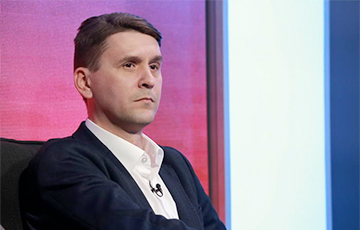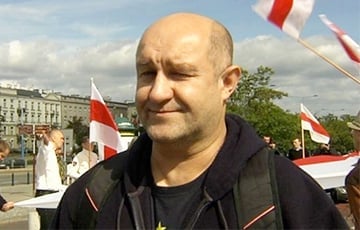Oleksandr Kovalenko: That's Major Blow To Russia's Reputation
6- 24.12.2024, 11:56
- 22,636

What was the most unexpected event in 2024?
What was the outgoing year for Ukraine and the world? Why will the war continue next year? The Charter97.org website sums up the results of the year with the Ukrainian military and political columnist of the Information Resistance group Oleksandr Kovalenko:
— The year has passed quite predictably. If we talk about the battlefield, then Ukraine was quite expectedly mainly on the defensive.
The reaction of Ukrainian citizens did not always correspond to, let's say, the correct, adequate perception of events. Many regard this with defeatist sentiments. Therefore, there was a negative perception of events in the combat zone, of course.
Russian propaganda resources, special services spreading information and psychological special operations have repeatedly tried to use this. A number of campaigns aimed at discrediting the military and political leadership of the country, the spread of fakes and manipulations associated with certain plums, contractors and many other issues were carried out.
The only thing that stood out from the general line is, of course, the Kursk operation. It was quite unexpected both in terms of the scale of the event and the final effect. As we can see, 2024 is coming to an end, and Russian troops, having total quantitative superiority in the Kursk region, even using the services of the DPRK army, cannot achieve the desired result, namely, to regain control over the Kursk region.
As for world events, the number one topic was, of course, the US elections. And these elections were a real roulette, a real casino, since both candidates, Kamala Harris and Donald Trump, were literally on a level playing field, everything was decided in recent weeks, even in the last days of the election campaign.
If we talk about foreign policy events, they all did not have some kind of unexpected character, with the exception of one thing — Syria. Syria has now made serious adjustments to the situation on the world stage, since the Syrian issue concerns a number of quite important regional players — Turkey and Israel, as well as world players — the United States.
Of course, this can be attributed to the biggest surprise, which not only surprised us all in 2024, but will also have a certain impact in 2025. Since Syria is the most serious reputational defeat of Russia after 2022, when its invasion of Ukraine failed. Russia is now forced to withdraw its troops from there.
— What are the results of this year for the 'Axis of Evil' in general? How did its actions affect international stability?
— I see the strengthening of the 'Axis of Evil', that's the thing. That is, the defeat of Bashar al-Assad is certainly a plus. But we see that throughout the year the ties and contacts between Russia and Iran have been strengthened, and it is especially worth noting the relations between Russia and North Korea. North Korea is now becoming not just a rather dangerous regional player, it is gradually reaching the world level.
At the end of the year, we saw not only the sending of millions of ammunition to Russia, we saw not only the sending of human resources, North Korean military and equipment (the same Koksan self-propelled guns, Bulsae-4, Bulsae-5, mobile anti-tank missile systems, 240-caliber multiple rocket launchers), now we also see the sending of medium-range ballistic missiles KN-15.
This drastically changes the whole situation, the whole balance of power and the whole balance in a cardinal way, since there have not yet been such supplies to a belligerent country. If the Western world continues to ignore all these events, then in 2025 there will be catastrophic consequences from Kim Jong-un's increased self-confidence in his impunity. Since it is the process of impunity for such steps that has led Pyongyang to feel much more confident today than any other democratic civilized country, which is often mired in bureaucracy in the process of supporting a partner or ally.
Dictatorships ignore all bureaucratic moments to help each other, so they carry out mutual support in one or another component much faster and wider.
— Many expect that 2025 will bring the end of the war. What key factors may affect the outcome of the war and the stabilization of the situation in the region?
— I look at 2025, let's say, more biased. To date, I do not see the prerequisites for the end of the war in the full sense of the word, since the end of the war in the understanding of Russia and in the understanding of Ukraine are completely different things. In Russia's understanding, it is the seizure of the entire territory of Ukraine, in Ukraine's understanding, it is the liberation of the territory of Ukraine according to the borders of 1991. That is what the end of the war is in our understanding.
If there is any achievement of an intermediate effect, it will be wrong. It will be another frozen conflict in the 30-year era of frozen conflicts that the spineless, amorphous, dysfunctional West has created.
And Ukraine is interested in resolving its issue by force, and not at the negotiating table, at which Moscow will put forward its ultimatums and will never make concessions to Kyiv. Now the situation shows that there is no such opportunity to find common ground for several reasons.
The first reason is that the territories that were seized by the Russian occupation army — the Kherson, Zaporizhzhia, Donetsk, Luhansk regions - were included in the Russian raped constitution as part of Russia. They perceive this, but none of these territories within their administrative borders is closed by Russian troops. That is, they do not fully control any of the regions. What about the Kursk region? If we cease fire, if we stop the hostilities, then what to do with the Kursk region, where the line of confrontation moves?
The second very important point, which suggests that the peace plan that Donald Trump still dreams about will not be implemented, is that Russia will demand the easing of sanctions for itself, this will be one of the points. And the easing of sanctions implies access of Russian energy, gas and oil to the European market. The United States will never allow this.
Here are at least two main points that say that the parties will not find a common language among themselves. The Ukrainian position remains unchanged — the borders of 1991.











